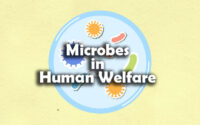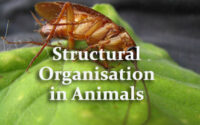Biomolecules Questions and Answers in Biology for Class 11 and Class 12
1. Which of the following are not polymeric?
A. Nucleic acids
B. Polysaccharides
C. Lipids
D. Proteins
2. Which one of the following statements is correct with reference to enzymes?
A. Apoenzyme = Holoenzyme + Coenzyme
B. Holoenzyme Apoenzyme + Coenzyme
C. Coenzyme = Apoenzyme+ Holoenzyme
D. Holoenzyme = Coenzyme + Co-factor
3. Which of the following is the least likely to be involved in stabilising the three-dimensional folding of most proteins?
A. Hydrogen bonds
B. Electrostatic interaction
C. Hydrophobic interaction
D. Ester bonds
4. A non-proteinaceous enzyme is
A. Ribozyme
B. Lysozyme
C. Deoxyribonuclease
D. ligase
5. A typical tat molecule is made up of
A. one glycerol and three fatty acid molecules
B. three glycerol and one fatty acid molecules
C. three glycerol and three fatty acid molecules
D. one glycerol and one fatty acid molecules
6. Which one of the following statements is wrong?
A. Uracil is a pyrimidine
B. Glycine is a sulphur containing amino acid
C. Sucrose is a disaccharide
D. Cellulose is a polysaccharide.
7. Assertion Carbohydrates are more suitable for the production of energy in the body than proteins and fats.
Reason: Carbohydrates can be stored in the tissues as glycogen and can be used for the production of energy, whenever necessary.
A. If both assertion and reason are true and reason is the correct explanation of assertion.
B. If both assertion and reason are true but reason is not the correct explanation of assertion.
C. If assertion is true but reason is false
D. If both assertion and reason are false.
8. In a polypeptide, amino acids are linked by
A. a hydrogen bond
B. a covalent bond
C. a peptide bond
D. an ester bond
9. Which of the following is/are cellulosic?
(i) Paper (ii) Cotton fibre (ii) Chitin (iv) Glycogen
A. (i) and (ii) only
B. (i) and (iii) only
C. (i), (ii) and (iv) only
D. (ii) and (iv) only
10. Pick out the alkaloid among the following
A. Morphine
B. Cellulose
C. Curcumin
D. Ricin
11. Which of the following statements about amino acids is false?
A. Based on the nature of the carboxyl group there are many amino acids
B. Amino acids are substituted methanes
C. Amino acids have an amino group and acidic group as substituents on the α-carbon.
D. There are four substituent groups occupying the four valency positions.
12. What is the role of competitive inhibitor during enzyme action?
A. It alters the active site of the enzyme and prevents the binding of substrate
B. It enhances enzyme action
C. It inhibits breaking of chemical bonds of the substrate
D. It declines the enzyme action.
13. In a polysaccharide, number of monosaccharides are linked by
A. glycosidic bond
B. hydrogen bond
C. peptide bond
D. phosphoester bond
14. Which one of the following is an incorrect combination?
A. Adenine, thymine, cytidine
B. Adenine, cytosine, thymine
C. Guanine, thymine, uracil
D. Cytosine, uracil, guamine
15. Cholesterol is a precursor for each of the following except
A. Vitamin D
B. Steroids
C. bile salts
D. Insulin
16. Assertion: Secondary metabolites are produced in small quantities and their extraction from the plant is difficult and expensive.
Reason: Secondary metabolites can be commercially produced by using tissue culture technique.
A. Both assertion and reason are true and reasons the correct explanation or assertion
B. Both assertion and reason are true but reason IS not the correct explanation of assertion
C. Assertion is true but reason is false
D. Both assertion and reason are false.
17. The chitinous exoskeleton of arthropods is formed by the polymerisation of
A. N-acetyl glucosamine
B. Lipoglycans
C. keratin sulphate and chondrotin sulpnate
D. glucosamine
18. Which of the following biomolecules does have a phosphodiester bond?
A. Amino acids in a polypeptide
B. Nucleic acids in a nucleotide
C. Fatty acids in a diglyceride
D. Monosaccharides in a polysaccharide
19. Which one of the following combinations of all three fatty acids are essential for human beings?
A. Oleic acid, linoleic acids and linolenic acid
B. Plamitic acid, linoleic acid and archidonic acid
C. Oleic acid, linoleic acid and arachidonic acid
D. Linoleic acid, linolenic acid and arachidonic
20. Which one of the following natural polymers is acid found both in insects and fungi?
A. Chitin
B. Suberin
C. Pectin
D. Cellulose
21. An allosteric inhibitor of the enzyme acts by binding to the
A. Substrate
B. catalytic site of the enzyme
C. non-catalytic site of the enzyme
D. product
22. Which of the following statements about the structure of proteins is true?
A. The sequence of amino acids in a protein represents the secondary structure
B. The helices of proteins are always left handed
C. Adult human haemoglobin consists of two Subunits
D. Proteins are heteropolymers containing strings
23. In the ribose of RNA, unlike DNA, every of amino acids nucleotide residue has an additional
A. COOH group in the 2′ position
B. OH group in the 5′ position
C. OH group in the 2 position
D. Phosphate group in the 2 position.
24. The moiety present at the 5 end of ribose sugar in a polynucleotide is
A. CH2
B. OH
C. Phosphate
D. adenine
25. Which of the following secondary metabolites belong to the group drugs?
(I) Morphine (II) Curcumin (III) Codeine (IV) Vinblastin (V) Abrin
A. (I) and (II) only
B. (I) and (V) only
C. (II) and (III) only
D. (II) and (IV) only
26. Which one of the following cannot be attributed to glycogen?
A. Homopolysaccharide
B. Heteropolysaccharide
C. Branched chain molecule
D. Stored in liver and muscle
27. Which of the following is a disaccharide?
A. Lactose
B. Galactose
C. Glucose
D. Starch
28. Cellulose is the polymer of
A. α-D glucose
B. α -D fructose
C. β -D glucose
D. β-D fructose.
29. Which of the following is an incorrect match of the cell type and the cell wall degrading enzyme?
A. Plant-Cellulase
B. Fungus-Chitinase
C. Alga Methylase
D. Bacteria-Lysozyme
30. Select the aromatic amino acid out of the following
A. Glycine (Gly)
B. Isoleucine (ile)
C. Valine (Val)
D. Tyrosine (Tyr)
31. Which is the correct set?
A. Trypsin Hormone
B. DInsulin- Enzyme
C. GLUT-4Enables glucose transport into cells
D. Collagen-Intracellular ground substance.
32. Which one of the following is the most abundant protein in the animal world?
A. Collagen
B. Trypsin
C. Insulin
D. Haemoglobin
33. The catalytic efficiency of two different enzymes can be compared by the
A. molecular size of the enzymes
B. pH optimum values
C. Km values
D. formation of the product.
34. Which of the following rules states that with increase of every 10°C temperature, the rate of metabolic process gets doubled
A. Van’t Hoff’s rule
B. Bergman’s rule
C. Allen’s rule
D. Jordan’s rule
35. ldentify the polypeptide subunits present in the adult haemoglobin
A. Two α-and two β-subunits
B. Four α-subunits
C. Four β-subunits
D. Three α-subunits and one β-subunits.
36. Identify the correct pair of statements
(i) Alternate name of thymine is 5-methyl uracil
(ii) Arachidonic acid molecule contains less number or carbons than palmitic acid
(iii) Cellulose contains complex helices
(iv) Aquaporin is a polypeptide
A. (ii), (iii)
B. (i), (ii)
C. (ii), (iv)
D. (i), (iv)
37. which of the following options consist of non-essential amino acids only?
A. Valine, leucine, glycine, alanine
B. Glycine, serine, proline, glutamic acid
C. Proline, aspartic acid, glutamic acid, methionine
D. Cysteine, tyrosine, alanine, isoleucine
38. Select the option which is not correct with respect to enzyme action
A. Substrate binds with enzyme at its active site
B. Addition of lot of succinate does not reverse the inihibition of succinic dehydrogenase by malonatee
C. A non-competitive inhibitor binds the enzyme at a site distinct from that which binds the enzyme at a site distinct from that which binds the substrate
D. Malonate is a competitive inhibitor of succinic dehydrogenase
39. Which one of the following is a non-reducing carbohydrate?
A. Maltose
B. Lactose
C. Sucrose
D. Ribose 5- phosphate
40. Glutenin is an important protein in
A. Potato
B. Soybean
C. Wheat
D. spinach
41. Which one of the following is enriched with a non-reducing sugar?
A. Germinating barley grains
B. Mothers milk
C. Grapes
D. Table sugar
42. The protein component of a holoenzymer is known as
A. Coenzyme
B. prosthetic group
C. cofactor
D. apoenzyme
43. Which of the following statements is wrong Sucrose?
A. It is a disaccharide
B. It is a non-reducing sugar
C. It accumulates in the cytoplasm
D. it is comprised of maltose and fructose
44. Km is a
A. Product
B. Constant
C. Enzyme
D. unit
45. Coenzymes NAD and NADP contain
A. Biotin
B. vitamin B12
C. niacin
D. thiamine
46. Which of the following scientists discovered the triple helical structure of collagen?
A. G. N. Ramachandran
B. Anton von Leeuwenhoek
C. Mathias Schleiden
D. Theodor Schwann
47. Which of the following statements regarding fat is true?
A. Archidonic acid has 20 carbons excluding the carboxyl carbon
B. Glycerol is trihydroxy propane
C. Paimitic acid has 18 carbons including the Carboxyl carbon
D. Oils have higher melting points than fats
48. ________ are the most abundant proteins in the living world.
A. PEP case of plants and keratin of animals
B. Ribozyme of plants and collagen of animals
C. Alcohol dehydrogenase of plants and melanin of animals
D. RuBisCO of plants and collagen of animals
49. Human haemoglobin contains
A. secondary structure
B. tertiary structure
C. quaternary structure
D. all the above
50. Fish proteins are considered nutritionally superior to most vegetable proteins because they are rich in
A. all the 20 amino acids
B. essential amino acids
C. peptide bonds
D. polypeptides



